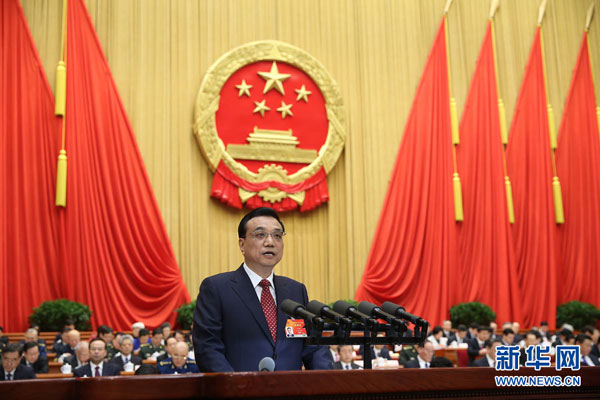


Premier Li Keqiang delivers a government work report at the opening ceremony of the 3rd Plenary Session of the 12th National People's Congress at the Great Hall of the People on March 5, 2015. [Photo: Xinhua]
Many Chinese leaders have been talking about the new normal when it comes to economic growth and the maturing of the Chinese economy.
"New normal" focuses on a shift from high-speed growth to moderately high growth. It also marks a shift from focusing on quantity and speed to focusing on quality and efficiency in the growth model. Adapting to the "new normal" is a strategic choice by the government to help the economy maintain steady and healthy development despite a slower growth rate.
Chen Fang is with the country's top political advisory body.
"It is strategic thinking and strategic choice for economic growth. It is defined in two words: 'new' and 'normal'. 'New' means we should have different development concepts as compared with before, and 'normal' means the economy should maintain a sustainable, steady and healthy growth."
Emphasizing economic restructuring, the "new normal" will put China's economic development on a more sustainable footing.
Liu Yonghao is an NPC deputy.
"We should get rid of the growth model that relies on blind investment, unscrupulous use of resources, and neglect of environmental protection. Our businesses, investment, and development should pay more attention to environmental protection and rational ways of using resources, while paying more attention to the impact of the development of businesses and the economy on the society."
Meanwhile, experts also have concerns and warnings. Yin Zhongqing, vice chairman of the Financial and Economic Committee of the NPC, says China should be alert to six risks in its "New Normal" economy.
Those include excess production capacity, price fluctuation in the housing market, local government debt, shadow banking, structural pressure on agriculture, and deflation.
To deal with these problems, Justin Yifu Lin, the former chief economist and senior vice president of the World Bank, told reporters that China may have comparative advantages in several different areas.
He says in equipment manufacturing, the country may concentrate on the electronics industry, materials industry, and precision instruments and the Chinese internet industry is another relatively new area with great potential.
He also provides some advices regarding excess production capacity.
"Even if there is excess production capacity , for example in the cement, steel or aluminum industry, with the investment in infrastructure construction like the 'Road and Belt Initiatives ', there will be a huge market for them."
Justin Yifu Lin shows great confidence to the Chinese economy, saying it has the potential to grow around 8 percent for about 20 years, though there's a discrepancy between a nation's growth potential and its actual growth rate.
"If we can deliver a good job, China's economic growth rate this year can be higher than 7 percent."
China's economy grew 7.4 percent last year, roughly in line with the target of around 7.5 percent, the slowest in 24 years, but is still robust by global standards. This year, China sets its GDP growth target at 7 percent, as the economy enters its "new normal".
 China hosts overseas disaster relief exercise for the first time
China hosts overseas disaster relief exercise for the first time 20 pairs of twins who will become flight attendants in Sichuan
20 pairs of twins who will become flight attendants in Sichuan J-11 fighters in air exercise
J-11 fighters in air exercise PLA soldiers operating vehicle-mounted guns in drill
PLA soldiers operating vehicle-mounted guns in drill Beauties dancing on the rings
Beauties dancing on the rings Blind carpenter in E China's Jiangxi
Blind carpenter in E China's Jiangxi Top 10 highest-paid sports teams in the world
Top 10 highest-paid sports teams in the world In photos: China's WZ-10 armed helicopters
In photos: China's WZ-10 armed helicopters UFO spotted in several places in China
UFO spotted in several places in China Obama is sowing discontent in S.China Sea
Obama is sowing discontent in S.China Sea Rescuers work through night to reach cruise ship survivors
Rescuers work through night to reach cruise ship survivors Driving through limbo
Driving through limbo Facing down MERS
Facing down MERSDay|Week